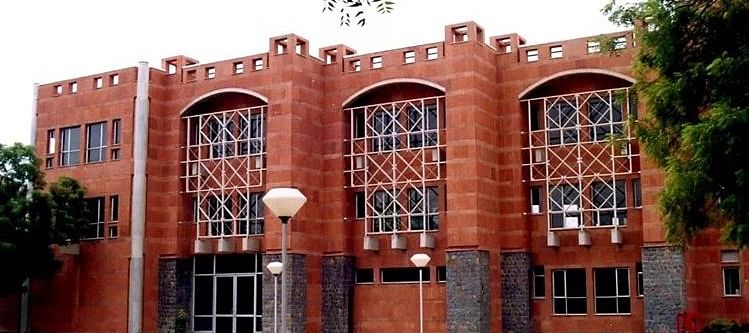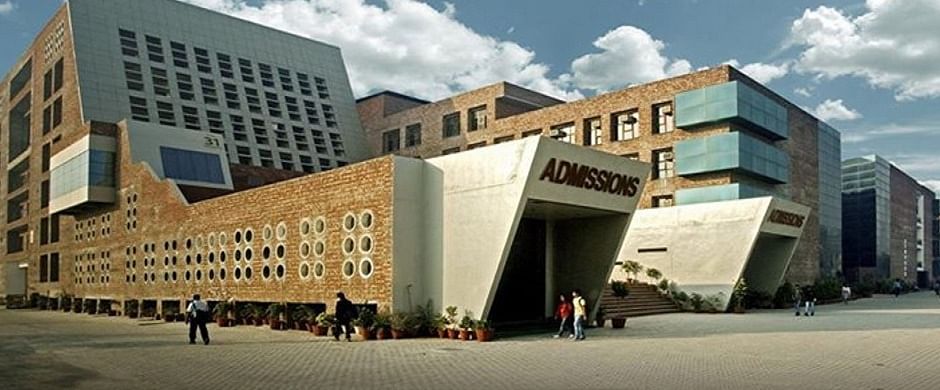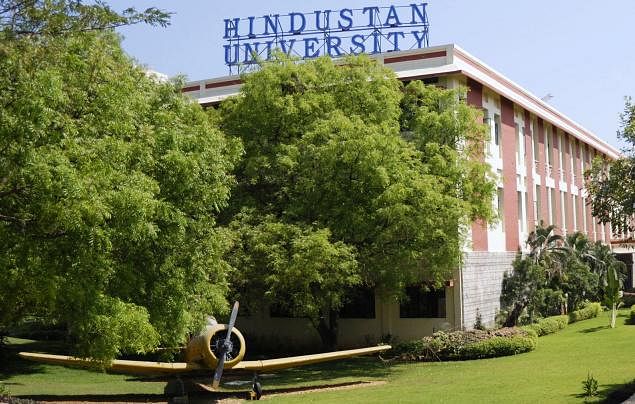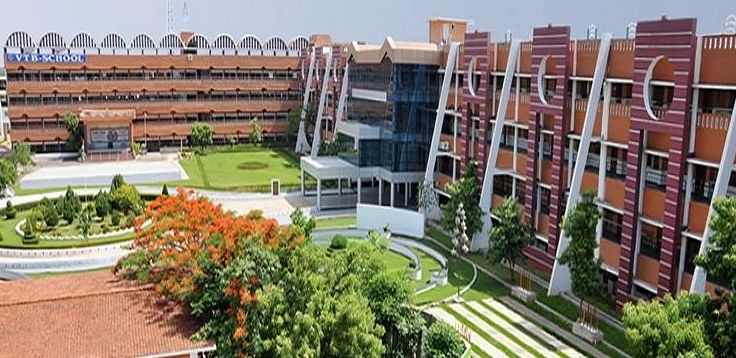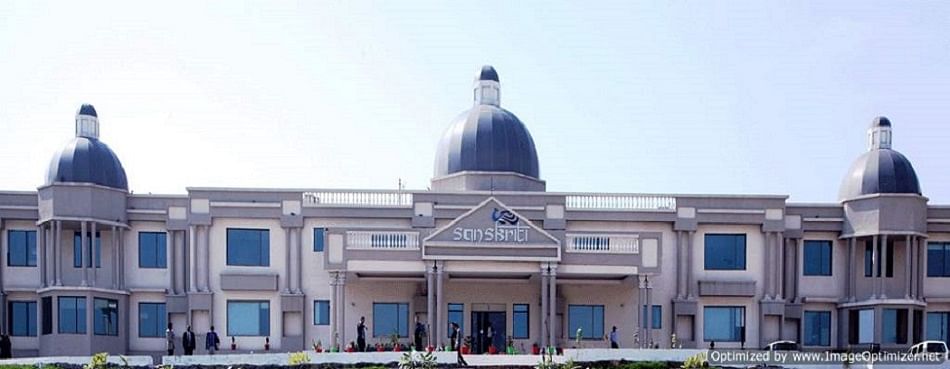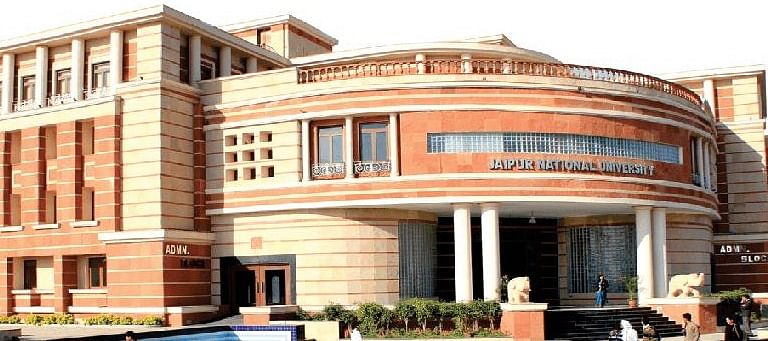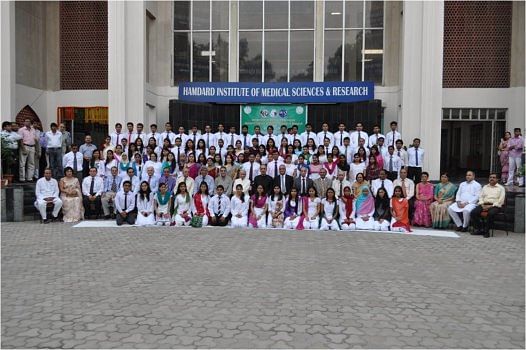B.Sc Cardiovascular Technology: Course Details, Eligibility, Admission, Fees
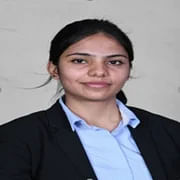
BSc Cardiovascular Technology is a three year undergraduate program that aims to provide comprehensive knowledge of human anatomy, echocardiography, and physiology, among other topics that are deeply embedded in the curriculum. BSc Cardiovascular Technology jobs after graduation include eco technician, medical sonographer, eco cardiographer, etc.
Table of Contents
- About BSc Cardiovascular Technology
- BSc Cardiovascular Technology Eligibility
- Who Should Pursue BSc Cardiovascular Technology Course?
- How To Get Admission for a BSc Cardiovascular Technology Course?
- Types of BSc Cardiovascular Technology Courses
- Popular Entrance Exams for BSc Cardiovascular Technology
- Top 10 BSc Cardiovascular Technology Colleges in India
- Fee Structure for BSc Cardiovascular Technology
- Syllabus and Subjects for BSc Cardiovascular Technology
- Why Choose BSc Cardiovascular Technology?
- BSc Cardiovascular Technology Course Comparison
- Preparation Tips for BSc Cardiovascular Technology Course
- Scope of BSc Cardiovascular Technology for Higher Education
- Salary of a BSc Cardiovascular Technology Graduate
- Career Options After BSc Cardiovascular Technology Graduation
- Skills That Make You the Best BSc Cardiovascular Technology Graduate
B.Sc Cardiovascular Technology Course Details
| Degree | Bachelors |
| Full Form | Bachelor of Science in Cardiovascular Technology |
| Duration | 3 Years |
| Age | There is no upper age limit |
| Entrance Exam | CUET, CUCET, NPAT, SUAT, etc. |
| Subjects Required | 10+2 with Physics, Chemistry and Biology |
| Minimum Percentage | 50% |
| Average Fees | ₹25K - 5 LPA |
| Average Salary | INR 2-8 LPA |
| Employment Roles | Medical Sonographers, Cardiovascular Technicians, Eco Technician, etc. |
About BSc Cardiovascular Technology
BSc Cardiovascular Technology course is related to identifying and keeping track of heart and circulation system diseases with help of the latest technologies. The BSc Cardiovascular Technology duration is three years with a one-year internship, divided into six semesters.
The BSc Cardiovascular Technology syllabus focuses on providing students with both academic and practical knowledge of current trends and practices. BSc Cardiovascular Technology job scope is extensive ranging from medical sonographer to cardiovascular technician in both the public and private sectors.
BSc Cardiovascular Technology Eligibility
BSc Cardiovascular Technology eligibility includes completing 10+2 minimum aggregate of 50% or above, from an accredited board. Students must pass the common entrance tests such as CUET, SUAT, etc in addition to completing the standard BSc Cardiovascular Technology eligibility standards. There is no upper age limit for enrollment in this course.
Who Should Pursue BSc Cardiovascular Technology Course?
Students who desire to enter a new area that offers a variety of roles in science and health services can consider a BSc Cardiovascular Technology course. Students with a keen interest in human anatomy, the latest cardiovascular technology, physiology, etc. can enroll in the course.
When To Do a BSc Cardiovascular Technology?
If a student wants to pursue a career in a science-related field, he or she should complete their 10+2 grade with a minimum of 50%–55% or above marks.
| B.Sc Cardiovascular Technology Entrance Exams | Top B.Sc Cardiovascular Technology Colleges in India |
How To Get Admission for a BSc Cardiovascular Technology Course?
Admission to the BSc Cardiovascular Technology course can be done through both online and offline methods. BSc Cardiovascular Technology admission can also be started by directly visiting the college's admissions office. The following topics answers to the admissions procedure in general:
How to Apply?
Students must go to the official websites of the colleges they intend to attend to begin the application process. By visiting the college admission office and submitting their application and any relevant papers, students can enroll offline.
Selection Process
The selection process for BSc Cardiovascular Technology admission programs can be done either via merit-based or entrance-based methods. Based on their academic performance, having completed their 12th grade with at least 50% in Biology, Chemistry, and Physics.
To get selected, applicants must pass an entrance exam like the CUET, SAT, CUCET, etc. Applicants are then qualified for the subsequent round of admission.
| Top Trending B.Sc Courses | |
| BSc Nursing | B.Sc Psychology |
| BSc Agriculture | B.Sc Forensic Science |
| BSc Computer Science | B.Sc IT |
| BSc Biotechnology | B.Sc Microbiology |
Check other important B.Sc Courses
Types of BSc Cardiovascular Technology Courses
The course have full-time, part-time, and distance options are available to aspirants for the course. The following BSc Cardiovascular Technology course details are provided below:
Full-Time BSc Cardiovascular Technology
The three-year plus one-year internship undergraduate BSc Cardiovascular Technology course is structured into six semesters. A full-time course has the advantage of allowing students to speed up their learning process and considerably increase their exposure and experience.
Part-Time BSc Cardiovascular Technology
For professionals who are currently employed and unable to take time off for full-time education, the part-time BSc Cardiovascular Technology course could be highly beneficial.
Distance BSc Cardiovascular Technology
BSc Cardiovascular Technology distance learning in India is for those who cannot attend regular sessions. BSc Cardiovascular Technology courses in India through distance learning is offered by a number of colleges and universities, such as IMTS University.
Popular Entrance Exams for BSc Cardiovascular Technology
For admission to the BSc Cardiovascular Technology course, several institutes in India have entrance exams. Some of the most common entrance exams for BSc Cardiovascular Technology course are listed below:
| B.Sc Cardiovascular Technology Entrance Exams | Registration Details |
| SUAT | SUAT Application Form |
| AP EAMCET | AP EAMCET Application Form |
| CUET | CUET Application Form |
| NPAT | NPAT Application Form |
| SET | SET Application Form |
| GCET | GCET Application Form |
A Quick Glance at the BSc Cardiovascular Technology Entrance Exams
The admission procedure for a BSc Cardiovascular Technology course can be conducted on the basis of entrance exams or merit. The following key points are listed to provide a quick overview of the structure of entrance exams:
- The question paper will contain three or four sections depending on the exam or university.
- The exam will be conducted either offline or online with OMR sheets with a duration of 3 hours.
- The syllabus, examination process, and question format may change according to the required demand as per the university.
Top 10 BSc Cardiovascular Technology Colleges in India
The BSc Cardiovascular Technology in India is a demanding and day-by-day emerging course. The following is a list of the top 10 best BSc Cardiovascular Technology colleges in India, along with their average fees:
|
S.No |
Name of the College |
Average Fees (INR) |
|
1 |
2.3 LPA |
|
|
2 |
2.3 LPA |
|
|
3 |
70,000 PA |
|
|
4 |
20,000 PA |
|
|
5 |
1.45 LPA |
|
|
6 |
2.7 LPA |
|
|
7 |
27,000 PA |
|
|
8 |
1 LPA |
|
|
9 |
1.29 LPA |
|
|
10 |
60,000 PA |
Top BSc Cardiovascular Technology Colleges in Delhi
The colleges that offer a BSc Cardiovascular Technology course in Delhi are listed below:
|
S.No |
Institution |
|
1 |
|
|
2 |
|
|
3 |
|
|
4 |
Top BSc Cardiovascular Technology Colleges in Andra Pradesh
Below is the list of BSc Cardiovascular Technology colleges in AP:
|
S.No |
Institution |
|
1 |
|
|
2 |
|
|
3 |
Mohan Babu University |
Top BSc Cardiovascular Technology Colleges in Kerala
Below is the list of colleges that offer a BSc Cardiovascular Technology course in Kerala :
|
S.No |
Institution |
|
1 |
|
|
2 |
|
|
3 |
|
|
4 |
Top BSc Cardiovascular Technology Private Colleges
The number of private universities offering a B.Sc in Cardiovascular Technology course has significantly increased in India. The following is a list of private colleges that offer a BSc Cardiovascular Technology course:
|
S.No |
Institution |
|
1 |
|
|
2 |
|
|
3 |
|
|
4 |
|
|
5 |
Top BSc Cardiovascular Technology Government Colleges
There are various government colleges that offer BSc Cardiovascular Technology course in India. The colleges are listed below:
|
S.No |
Institution |
|
1 |
|
|
2 |
|
|
3 |
|
|
4 |
Fee Structure for BSc Cardiovascular Technology
The fee of the BSc in Cardiovascular Technology course is variable and depends on a number of criteria. The BSc Cardiovascular Technology fees take all of these factors into account: location, faculty, demand, infrastructure, and the resources that students may access. The average BSc Cardiovascular Technology course fee in India is around INR 25,000–5 LPA.
|
Sl.No. |
Name of the College |
Average Fee Structure (INR) |
|
1. |
Manipal Academy of Higher Education, Manipal |
2.3 LPA |
|
2. |
Kasturba Medical College, Mangalore |
2.3 LPA |
|
3. |
Parul University, Vadodara |
70,000 PA |
|
4. |
Government Medical College, Kozhikode |
20,000 PA |
|
5. |
Saveetha Institute of Medical and Science, Chennai |
1.45 LPA |
Syllabus and Subjects for BSc Cardiovascular Technology
The BSc Cardiovascular Technology course has a three-year duration and is divided into six semesters.The BSc Cardiovascular Technology curriculum is structured to enable student learning advancement and professional success. The following topics will be covered in this course:
- Cardiac physiology
- Pathology, microbiology, pharmacology, and therapeutics
- Fundamentals of Computers
- Medical electronics of cardiac technology
- Coronary Angiography
Read More: BSc Cardiovascular Technology Syllabus and Subjects
Why Choose BSc Cardiovascular Technology?
It's crucial to comprehend a few factors associated with any course of study before choosing it, such as “What is a BSc Cardiovascular Technology course?", "What is the future scope of a BSc Cardiovascular Technology? Etc. The brief responses offered below can be used by students to comprehend about the course.
What is BSc Cardiovascular Technology Course All About?
BSc Cardiovascular Technology is a three-year plus one-year internship undergraduate program, which is divided into six semesters. The course offers knowledge about various concepts of technologies used to treat cardiovascular disorders and the application of the issues of heart diseases and their treatment.
What Does a BSc Cardiovascular Technology Graduate Do?
With the BSc Cardiovascular Technology course, there are several professions where building a successful career offers good opportunities. Graduates of the BSc Cardiovascular Technology course are employed by a wide range of hospitals, clinics, etc., where they must conceptually tie every aspect of subject knowledge to their practical experience.
Cardiovascular Technologist: They are specialists in evaluating, identifying, and treating vascular issues and conditions associated to the heart. They typically support medical professionals, including doctors and surgeons, in detecting problems with the heart and arteries.
Reasons Why a BSc Cardiovascular Technology Course Can Fetch You a Rewarding Career?
The BSc Cardiovascular Technology course offers a variety of job opportunities. Students can evaluate the inherent value of the programme because a BSc Cardiovascular Technology course offers a wide range of professional prospects, from an echocardiographer, and medical sonographer to a cath lab technician. A BSc Cardiovascular Technology scope is associated with promising opportunities and increasing potential.
- Demand: Students can select from a range of opportunities at renowned domestic and international hospitals/organizations through the BSc Cardiovascular Technology course.
- Career Growth: BSc Cardiovascular Technology graduates can choose from a variety of positions, such as cardiovascular technologist, echocardiographer, etc. After learning domain expertise, candidates can advance in their careers.
Read More: BSc Cardiovascular Technology Jobs & Scope
BSc Cardiovascular Technology Course Comparison
Below is a comparison of the BSc Cardiovascular Technology course details with other courses:
BSc Cardiovascular Technology vs BSc Cardiac Technology
The table below showcases the differences between BSc Cardiovascular Technology and BSc Cardiac Technology:
|
Course |
BSc Cardiovascular Technology |
BSc Cardiac Technology |
|
Full Form |
Bachelor of Science in Cardiovascular Technology |
Bachelor of Science in Cardiac Technology |
|
Stream |
Science |
Science |
|
Duration |
3 years + 1-year Internship |
3 years + 1-year Internship |
|
Eligibility |
10+2 with Physics, Chemistry and Biology |
10+2 with Physics, Chemistry and Biology |
|
Entrance Exams |
NPAT, CUET, SET, CUCET |
DUET, JNUEE, BITSAT, BHU PET |
|
Top Colleges |
KMC Mangalore, MAHE Manipal, Galgotias University |
Rajiv Gandhi Paramedical Institute, Christain Medical College, JSS Medical College |
|
Fees |
INR 25,000- 5 LPA |
INR 50,000- 4 LPA |
Read More: BSc Cardiac Technology
Preparation Tips for BSc Cardiovascular Technology Course
A number of important factors should be taken into account by students before deciding whether to pursue a BSc Cardiovascular Technology course. By putting these crucial study tips into practice, students can excel in their studies, pass the course, and ace the exams:
- Syllabus Completion: The course syllabus must be well understood by the learner. This crucial first step marks the start of the preparation procedure.
- Exam Format: Understand the format of the exam and the kinds of questions that are typically asked. The likelihood of the kids receiving multiple-choice questions is relatively high.
- Review of Key Topics: Students should pay greater attention to these subjects because they are tested on more frequently.
- Practice: Utilize sample exams and test questions from prior years to prepare for the questions.
Scope of BSc Cardiovascular Technology for Higher Education
Scope of BSc Cardiovascular Technology is vast, which gives candidates a chance to pursue higher studies after obtaining the degree. The following are some of the best higher education programs in the particular area:
Salary of a BSc Cardiovascular Technology Graduate
Depending on the role that graduates work in, the salary can vary. There are a number of other factors that may affect BSc Cardiovascular Technology salary in India, in addition to experience, location, and the industry they work in.
Candidates may advance to higher positions and earn greater salary slabs as they get more experience and practical exposure. The average BSc Cardiovascular Technology salary for graduates is around INR 2–8 LPA. [Source: PayScale].
Read More: BSc Cardiovascular Technology Salary
Career Options After BSc Cardiovascular Technology Graduation
For a BSc Cardiovascular Technology graduate, there are many positions available in both the private and public sectors. For graduates of the BSc Cardiovascular Technology, the following job profiles offer competitive pay scales:
- Cardiovascular Technologist
- Medical Sonographer
- Cardiovascular Technician
- Registered Vascular Specialist
- Professor/Teacher
Skills That Make You the Best BSc Cardiovascular Technology Graduate
To excel as a BSc Cardiovascular Technology graduate, many skills are required that will help to increase the individual learning curve and boost a practical approach to problem-solving must be inculcated in the continuing learning environment.
- Problem-Solving skills
- Communication skills
- Interpersonal skills
- Leadership skills


